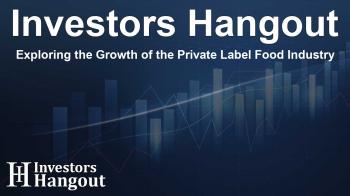Exploring the Growth of the Private Label Food Industry

Understanding the Surge in the Private Label Food and Beverages Market
The global private label food and beverages market, valued at USD 243.95 billion in 2024, is set to experience remarkable growth, projected to reach around USD 393.60 billion by 2034. The compound annual growth rate (CAGR) of 4.9% from 2025 to 2034 reflects a significant trend where consumers seek quality products at attractive prices.
Recently, consumer behavior has shifted dramatically. More individuals are choosing private labels, drawn by their affordability, enhanced quality, and trustworthiness. With retailers establishing strong relationships with third-party manufacturers, these brands are gaining ground by mimicking popular products while maintaining lower prices.
Market Drivers Behind The Growth
A major factor contributing to this market growth is a heightened level of consumer trust in private label offerings. Retailers are investing in quality control measures, ensuring that their branded products meet consumer expectations for quality. As younger consumers increasingly prioritize health and environmental sustainability, private labels are adapting to meet these demands, which further fuels their popularity.
Price-conscious consumers view private labels as viable alternatives to established brands. The idea of getting comparable quality for a lower price is appealing, particularly in times of economic uncertainty. The transition toward online shopping has also bolstered the visibility of private labels, making them more accessible to a broader audience.
Region-Wise Market Insights
Europe is at the forefront of the private label food and beverages market, holding a substantial market share of approximately 16% in 2024. The region's consumers have shown a willingness to trust private labels, particularly as retailers focus on transparency and accountability in their product offerings. In contrast, the Asia-Pacific region is emerging as the fastest-growing market, driven by urbanization and increasing disposable incomes, which enable greater access to these products.
Countries like India are witnessing notable growth in demand. Retail modernization and online grocery penetration are providing consumers in Tier II and III cities with access to an array of private label products, reinforcing their appeal.
Segment Performance and Consumer Preferences
Analyzing the segments, the bakery and confectionery category is already the titan of this market, dominating with around 20% market share in 2024. Alternatively, the convenience of frozen ready-to-eat meals is propelling this segment toward rapid growth, especially among consumers with busy lifestyles.
When it comes to beverages, non-alcoholic options lead the market share, with functional drinks on the rise as consumers gravitate towards beverages that enhance health and wellness. This trend is largely driven by the growing health-conscious consumer base that favors products emphasizing well-being.
Future Trends Shaping the Market
Looking ahead, trends in the private label food market appear promising. Consumers are increasingly demanding clean label products with transparent sourcing and ingredient listings. The push for vegan and plant-based formulations is also increasing, with more brands adjusting their offerings to cater to this rising consumer group. Additionally, innovative packaging solutions such as flexible and tetra packs that ensure product safety and shelf life are gaining ground.
Retail environments are changing as well. The traditional dominance of supermarkets and hypermarkets is showing signs of competition from online retailers, which are increasingly making it easier for consumers to access a vast range of private label options. This convenience, paired with an expansive product variety, is set to significantly drive market growth.
Key Players and Market Dynamics
In the competitive landscape of the private label sector, key players include established supermarkets like Kroger and Aldi, which are rapidly expanding their private brand portfolios. The emphasis has been on developing high-quality, sustainable product lines to attract a discerning customer base.
As price-sensitive consumers continue to influence market dynamics, it is vital for private label brands to maintain high standards while enhancing affordability. Additionally, the slow growth in trust within certain regional markets presents challenges that retailers must navigate to secure a larger market share.
Frequently Asked Questions
1. What is the current size of the private label food market?
The private label food and beverages market size stood at USD 243.95 billion in 2024.
2. What growth rate is expected for the private label market?
The market is projected to grow at a CAGR of 4.9%, reaching approximately USD 393.60 billion by 2034.
3. Which region is leading in the private label food segment?
Europe holds the largest market share with around 16%, while the Asia-Pacific region is expected to be the fastest growing.
4. What factors contribute to consumer trust in private labels?
Quality assurances, competitive pricing, and transparency in ingredient sourcing boost consumer trust in private label products.
5. How do trends in health consciousness affect the market?
The increasing demand for health-focused products, including clean label and plant-based options, is reshaping consumer preferences and driving market growth.
About The Author
Contact Lucas Young privately here. Or send an email with ATTN: Lucas Young as the subject to contact@investorshangout.com.
About Investors Hangout
Investors Hangout is a leading online stock forum for financial discussion and learning, offering a wide range of free tools and resources. It draws in traders of all levels, who exchange market knowledge, investigate trading tactics, and keep an eye on industry developments in real time. Featuring financial articles, stock message boards, quotes, charts, company profiles, and live news updates. Through cooperative learning and a wealth of informational resources, it helps users from novices creating their first portfolios to experts honing their techniques. Join Investors Hangout today: https://investorshangout.com/
The content of this article is based on factual, publicly available information and does not represent legal, financial, or investment advice. Investors Hangout does not offer financial advice, and the author is not a licensed financial advisor. Consult a qualified advisor before making any financial or investment decisions based on this article. This article should not be considered advice to purchase, sell, or hold any securities or other investments. If any of the material provided here is inaccurate, please contact us for corrections.

